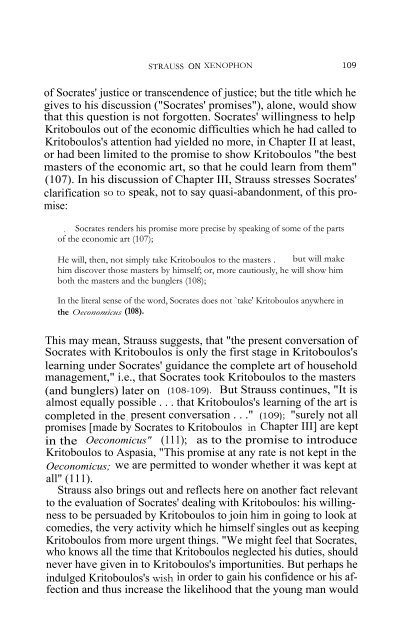Strauss on Xenophon's Socrates Xenophon's Socratic Discourse: An ...
Strauss on Xenophon's Socrates Xenophon's Socratic Discourse: An ...
Strauss on Xenophon's Socrates Xenophon's Socratic Discourse: An ...
You also want an ePaper? Increase the reach of your titles
YUMPU automatically turns print PDFs into web optimized ePapers that Google loves.
STRAUSS ON XENOPHON 109<br />
of <strong>Socrates</strong>' justice or transcendence of justice; but the title which he<br />
gives to his discussi<strong>on</strong> ("<strong>Socrates</strong>' promises"), al<strong>on</strong>e, would show<br />
that this questi<strong>on</strong> is not forgotten. <strong>Socrates</strong>' willingness to help<br />
Kritoboulos out of the ec<strong>on</strong>omic difficulties which he had called to<br />
Kritoboulos's attenti<strong>on</strong> had yielded no more, in Chapter II at least,<br />
or had been limited to the promise to show Kritoboulos "the best<br />
masters of the ec<strong>on</strong>omic art, so that he could learn from them"<br />
(107). In his discussi<strong>on</strong> of Chapter III, <str<strong>on</strong>g>Strauss</str<strong>on</strong>g> stresses <strong>Socrates</strong>'<br />
clarificati<strong>on</strong> so to speak, not to say quasi-aband<strong>on</strong>ment, of this promise:<br />
. <strong>Socrates</strong> renders his promise more precise by speaking of some of the parts<br />
of the ec<strong>on</strong>omic art (107);<br />
He will, then, not simply take Kritoboulos to the masters . but will make<br />
him discover those masters by himself; or, more cautiously, he will show him<br />
both the masters and the bunglers (108);<br />
In the literal sense of the word, <strong>Socrates</strong> does not `take' Kritoboulos anywhere in<br />
the Oec<strong>on</strong>omicus (108).<br />
This may mean, <str<strong>on</strong>g>Strauss</str<strong>on</strong>g> suggests, that "the present c<strong>on</strong>versati<strong>on</strong> of<br />
<strong>Socrates</strong> with Kritoboulos is <strong>on</strong>ly the first stage in Kritoboulos's<br />
learning under <strong>Socrates</strong>' guidance the complete art of household<br />
management," i.e., that <strong>Socrates</strong> took Kritoboulos to the masters<br />
(and bunglers) later <strong>on</strong> (108-109). But <str<strong>on</strong>g>Strauss</str<strong>on</strong>g> c<strong>on</strong>tinues, "It is<br />
almost equally possible . . . that Kritoboulos's learning of the art is<br />
completed in the , present c<strong>on</strong>versati<strong>on</strong> . . ." (109); "surely not all<br />
promises [made by <strong>Socrates</strong> to Kritoboulos in Chapter III] are kept<br />
in the Oec<strong>on</strong>omicus" (111); as to the promise to introduce<br />
Kritoboulos to Aspasia, "This promise at any rate is not kept in the<br />
Oec<strong>on</strong>omicus; we are permitted to w<strong>on</strong>der whether it was kept at<br />
all" (111).<br />
<str<strong>on</strong>g>Strauss</str<strong>on</strong>g> also brings out and reflects here <strong>on</strong> another fact relevant<br />
to the evaluati<strong>on</strong> of <strong>Socrates</strong>' dealing with Kritoboulos: his willingness<br />
to be persuaded by Kritoboulos to join him in going to look at<br />
comedies, the very activity which he himself singles out as keeping<br />
Kritoboulos from more urgent things. "We might feel that <strong>Socrates</strong>,<br />
who knows all the time that Kritoboulos neglected his duties, should<br />
never have given in to Kritoboulos's importunities. But perhaps he<br />
indulged Kritoboulos's wish in order to gain his c<strong>on</strong>fidence or his affecti<strong>on</strong><br />
and thus increase the likelihood that the young man would

















